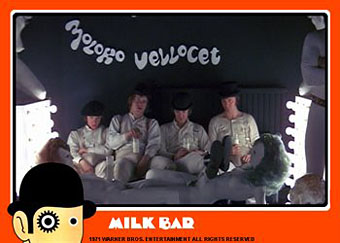
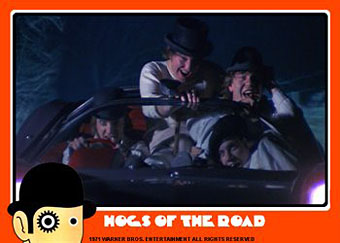
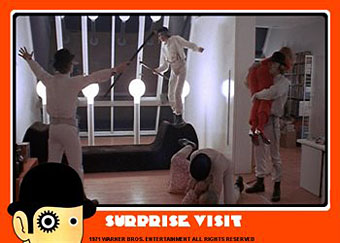
Oh, if only…
From Bubblegumfink who specialises in creations like these. Via Boing Boing.
Previously on { feuilleton }
• Alex in the Chelsea Drug Store
A journal by artist and designer John Coulthart.
Film



Oh, if only…
From Bubblegumfink who specialises in creations like these. Via Boing Boing.
Previously on { feuilleton }
• Alex in the Chelsea Drug Store
Yes, a documentary about a typeface by Gary Hustwit. And why not, say I? More films about typography, please. I paid homage to the ubiquitous Swiss font with my design for Savoy’s A Serious Life which used Helvetica Neue in various weights throughout.
Helvetica is a feature-length independent film about typography, graphic design and global visual culture. It looks at the proliferation of one typeface (which will celebrate its 50th birthday in 2007) as part of a larger conversation about the way type affects our lives. The film is an exploration of urban spaces in major cities and the type that inhabits them, and a fluid discussion with renowned designers about the choices and aesthetics behind their use of type.
Helvetica encompasses the worlds of design, advertising, psychology, and communication, and invites us to take a second look at the thousands of words we see every day.
The film was shot in high-definition on location in the United States, England, the Netherlands, Germany, Switzerland, France and Belgium. It is currently in post-production and is slated to begin screening at film festivals worldwide starting in early 2007.
Interviewees in Helvetica include some of the most illustrious and innovative names in the design world, including Erik Spiekermann, Matthew Carter, Massimo Vignelli, Michael Bierut, Wim Crouwel, Hermann Zapf, Stefan Sagmeister, Jonathan Hoefler, Tobias Frere-Jones, Experimental Jetset, and many more.
Via Typographica.
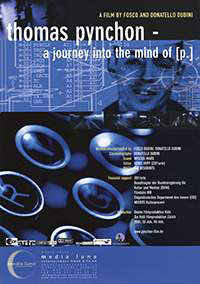
Thomas Pynchon – A Journey into the Mind of [P.] (2001)
Written and directed by Fosco Dubini
and Donatello Dubini
Music by The Residents
Language: English
Runtime: 96mins
“Things are not as they seem.” In US writer Thomas Pynchon’s case, this is a mantra, cornerstone to a life and labyrinthine oeuvre freighted with ceaseless speculation. In books like V. and Gravity’s Rainbow, the covert arenas of the contemporary order (the military-industrial complex, governmental conspiracy, the sinister reaches of science) mesh with counter-cultural values, permeating paranoia, arcane knowledge-systems and profoundly ironic humour in an encyclopaedic investigation of modernity. Central to this is a (doomed) quest for some singular explanation of things, a motif taken up by the Dubini duo in their intriguing derive that takes in his biography, times and obsessive supporters.
On the surface it’s a tall order: Pynchon is one of the great cultural recluses, unphotographed for 40 years, his absence from the flashgun glare now an inseparable part of his “project.” So the film offers an atmospheric collage, chaptered around varying recollections and his synchronicity with resonant aspects of post-war US society. Apposite newsreel and found-footage of missile experiments and Agency psychedelics tests mix with talking heads, spoken extracts and Pynchon’s articulate fans. Stand-ins, doubles, lookalike contestants populate a shifting reality, scored to a trippy, fragmented soundscape care of The Residents, that builds towards a compelling final act, searching for the grail of a new image of the writer. Reflecting the hall of mirrors in which the novels, history, the novelist and his “researchers” move, this documentary, while uneven and occasionally over-extended, provides required viewing for devotees, and should reward those keen to explore the mysterious dynamics of the age via one of their definitive surveillants.
Gareth Evans, Time Out.
The Grey Lodge is torrenting a 632MB avi version. Buy the DVD here.
Previously on { feuilleton }
• A literary event: new Thomas Pynchon
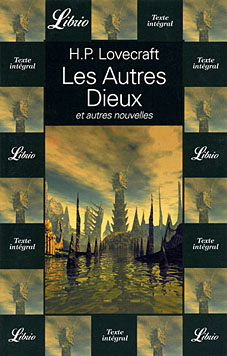 I’ll be in Paris this week so some French-related postings are in order.
I’ll be in Paris this week so some French-related postings are in order.
Michel Houellebecq’s HP Lovecraft: Against the World, Against Life (which I still haven’t read) has been in the news again recently, with a number of reviews appearing in UK newspapers and magazines, most of which present the by-now rather tired spectacle of reviewers who normally wouldn’t give any of this nasty pulp stuff a second thought having to take Lovecraft seriously because Houellebecq is a serious author. (“He’s a bad writer!” they bleat. And Lou Reed is a bad singer; you’re missing the point, you fools.) The Observer last week had one of the better ones. Last year the Guardian published an extract from Houellebecq’s book.
Curious how often it requires the French to make the Anglophone world look anew at marginalised elements of its own culture; Baudelaire championed Edgar Allan Poe, it was French film critics who gave us the term “film noir” when they identified a new strain of American cinema and the Nouvelle Vague writers and filmmakers were the first to treat Hitchcock as anything other than a superior entertainer. The French have always liked Lovecraft so it was no surprise to me at least when Houellebecq’s book appeared.
Oddly enough, the only association I’ve had so far with French publishing is the use of my 1999 picture of Cthulhu’s city, R’lyeh, on the cover of a reprint of HPL stories from Houellebecq’s publishing house (above). Something I’ll be looking for in Paris if I have the time will be more of Philippe Druillet‘s Lovecraft-inflected work. Druillet has been working with the imagery of cosmic horror since the late 60s and even illustrated the work of William Hope Hodgson, one of HPL’s influences and an English writer the broadsheet critics have yet to hear about. Take a look at these pictures for stories written before the First World War then go and look at some stills from the latest Pirates of the Caribbean movie. What was once the preserve of Weird Tales and other pulp magazines is now mainstream culture.
Previously on { feuilleton }
• Davy Jones
• Charles Méryon’s Paris
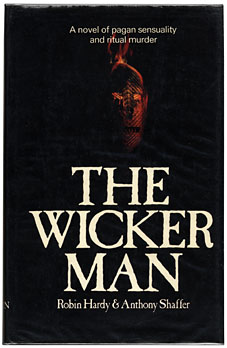 Left: The scarce first edition of the Hamlyn novelisation. From the Coulthart library.
Left: The scarce first edition of the Hamlyn novelisation. From the Coulthart library.
I realised some years ago that all my favourite films have great soundtracks, almost without exception. Something about the blend of drama and well-chosen music really excites me, so it’s no surprise that The Wicker Man would appeal, having as it does a wonderful folk soundtrack. Nice to see from the discussion that follows how influential this soundtrack has been although I’m surprised they didn’t mention the multiple cover versions of Willow’s Song. Once again Hollywood has seen fit to gift us with a completely redundant cover version of their own; the less said about the imminent remake, the better.
‘It was a way into a magical world’
The Wicker Man is the unlikely inspiration to a new generation of British folk musicians. So we put the film’s musical fans in a room with its director to discuss its enduring appeal. By Will Hodgkinson.
Will Hodgkinson
Friday July 21, 2006
The Guardian
ONE OF THE unlikeliest motivating factors in the current wave of new British folk music is a horror movie from three decades ago. The Wicker Man, the story of an upright Christian police officer investigating the disappearance of young girl on the Scottish island of Summerisle, and stumbling across a pagan cult, is hardly a masterpiece. But it has endured as a cult classic because it is unique, fascinating and evocative. Its folk-based soundtrack and use of ancient rituals and mythology have made it the focal point for a new generation of British musicians. So, as the gods of creation poured golden light into a sacred hall (a meeting room at the Guardian) on a summer afternoon, we assembled a handful of Wicker Man-obsessed musicians to discuss the film’s influence with its director, Robin Hardy… (more)